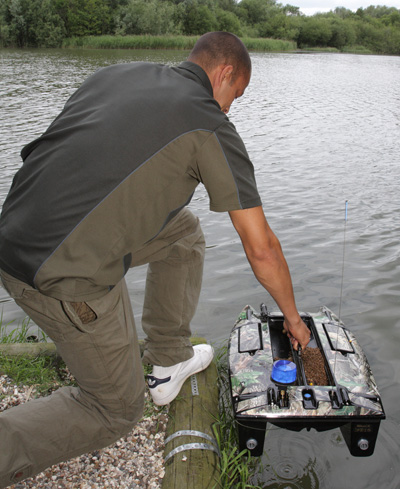Part of the wonder of angling is its uncertainty; it’s an inexact science subject to Nature’s changing mood, the angler’s level of confidence, his bait, his equipment and any number of other influences too numerous to mention.
There will always be factors beyond our control but some problems once seen as insurmountable have now been solved – creating other problems in the process! Who among the carp-fishing fraternity has never noticed how one particular spot, way out, regularly plays host to a thunder-clapping carp? Few I would gamble. And which of them never fixed his eyes on that distant mark and had them glaze over in contemplation: how can I get a bait out there?
Every similarly frustrated carp fisherman in history must have dreamt of owning a mini boat, a radio-controlled craft on which he could place his bait and have it deposited right where ‘X’ marks the spot! Today’s heavy carping methods have, in most cases, sorted the distance problem, but accuracy at 160 metres plus still isn’t an easy task so, for those determined enough to achieve their goal, the advent of the modern bait boat is quite literally a dream come true; not only can they now drop their rig precisely where they want it but they can bait the area (with as much as four kilos of freebies!) in so doing.

Once the trap is set the carp fisherman steers his craft back to base and sits back to await events. But is this ‘progress’?
The answer to this will depend very much on your definition of ‘progress’: must ‘progress’ always have a beneficial outcome to be considered ‘progressive’? Can something that is technologically superior to all of its predecessors but without adding to the sum of Human happiness be deemed ‘better’, ‘advanced’…’progressive’? If it can, then what if this piece of improved, state-of-the-art wizardry also has negative effects, drawbacks, disadvantages? Would this cancel-out those attributes that previously defined it as ‘progressive’?
Many would say so.
 They might argue that any large, conspicuous item of fishing tackle fashioned from high-gloss fibreglass or plastic has no place in an essentially natural environment; that the very design – sleek, smooth, dynamic – is fundamentally at odds with what I have previously described as the inexact, uncertain world of angling. They would say that ‘the boat’ does away with the need for casting and catapulting skills; that ‘the boat’ constitutes an eyesore, a blot on the lake, a technological step too far. ‘Victims’ of boat-intrusion will vigorously condemn the boat and its user for disrupting their fishing: how would you like your perfectly-positioned floater disturbed by a passing mini-ship? And is nothing sacred? Can you not accept (they would say) that an element of impossibility is actually good for the soul… to know that you’ll never be able to fish right in that distant gap and that such inaccessibility leaves the angler something to dream about – and gives refuge to pressured fish?
They might argue that any large, conspicuous item of fishing tackle fashioned from high-gloss fibreglass or plastic has no place in an essentially natural environment; that the very design – sleek, smooth, dynamic – is fundamentally at odds with what I have previously described as the inexact, uncertain world of angling. They would say that ‘the boat’ does away with the need for casting and catapulting skills; that ‘the boat’ constitutes an eyesore, a blot on the lake, a technological step too far. ‘Victims’ of boat-intrusion will vigorously condemn the boat and its user for disrupting their fishing: how would you like your perfectly-positioned floater disturbed by a passing mini-ship? And is nothing sacred? Can you not accept (they would say) that an element of impossibility is actually good for the soul… to know that you’ll never be able to fish right in that distant gap and that such inaccessibility leaves the angler something to dream about – and gives refuge to pressured fish?
They’d have some good points, would they not? But it’s debatable if their argument could out-weigh that of the modern, pragmatic carp-fisherman who sincerely believes his world to be one where results are paramount: “you’ve always fantasized about a remote-controlled bait-boat – well now you can have one! What are you complaining about?” He’d have a good point too, wouldn’t he?
It might well be that opponents of bait-boating (or boat-baiting) are, actually, just upset by their sheer availability; that anyone and everyone can now fish with pin-point accuracy in exchange for some filthy lucre…everything would be just fine if only they had rights of use!
Over to you, readers…what do you think? Would you go for a ban? Or would you like to see the hydro-jet version?













